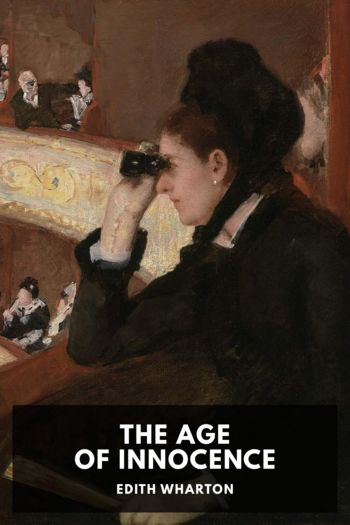The House of Mirth, Edith Wharton [series like harry potter txt] 📗

- Author: Edith Wharton
Book online «The House of Mirth, Edith Wharton [series like harry potter txt] 📗». Author Edith Wharton
Lily had not been long in this pallid world without discovering that Mrs. Hatch was its most substantial figure. That lady, though still floating in the void, showed faint symptoms of developing an outline; and in this endeavour she was actively seconded by Mr. Melville Stancy. It was Mr. Stancy, a man of large resounding presence, suggestive of convivial occasions and of a chivalry finding expression in “first-night” boxes and thousand dollar bonbonnières, who had transplanted Mrs. Hatch from the scene of her first development to the higher stage of hotel life in the metropolis. It was he who had selected the horses with which she had taken the blue ribbon at the Show, had introduced her to the photographer whose portraits of her formed the recurring ornament of “Sunday Supplements,” and had got together the group which constituted her social world. It was a small group still, with heterogeneous figures suspended in large unpeopled spaces; but Lily did not take long to learn that its regulation was no longer in Mr. Stancy’s hands. As often happens, the pupil had outstripped the teacher, and Mrs. Hatch was already aware of heights of elegance as well as depths of luxury beyond the world of the Emporium. This discovery at once produced in her a craving for higher guidance, for the adroit feminine hand which should give the right turn to her correspondence, the right “look” to her hats, the right succession to the items of her menus. It was, in short, as the regulator of a germinating social life that Miss Bart’s guidance was required; her ostensible duties as secretary being restricted by the fact that Mrs. Hatch, as yet, knew hardly anyone to write to.
The daily details of Mrs. Hatch’s existence were as strange to Lily as its general tenor. The lady’s habits were marked by an Oriental indolence and disorder peculiarly trying to her companion. Mrs. Hatch and her friends seemed to float together outside the bounds of time and space. No definite hours were kept; no fixed obligations existed: night and day flowed into one another in a blur of confused and retarded engagements, so that one had the impression of lunching at the tea-hour, while dinner was often merged in the noisy after-theatre supper which prolonged Mrs. Hatch’s vigil till daylight.
Through this jumble of futile activities came and went a strange throng of hangers-on—manicures, beauty-doctors, hairdressers, teachers of bridge, of French, of “physical development”: figures sometimes indistinguishable, by their appearance, or by Mrs. Hatch’s relation to them, from the visitors constituting her recognized society. But strangest of all to Lily was the encounter, in this latter group, of several of her acquaintances. She had supposed, and not without relief, that she was passing, for the moment, completely out of her own circle; but she found that Mr. Stancy, one side of whose sprawling existence overlapped the edge of Mrs. Fisher’s world, had drawn several of its brightest ornaments into the circle of the Emporium. To find Ned Silverton among the habitual frequenters of Mrs. Hatch’s drawing-room was one of Lily’s first astonishments; but she soon discovered that he was not Mr. Stancy’s most important recruit. It was on little Freddy Van Osburgh, the small slim heir of the Van Osburgh millions, that the attention of Mrs. Hatch’s group was centred. Freddy, barely out of college, had risen above the horizon since Lily’s eclipse, and she now saw with surprise what an effulgence he shed on the outer twilight of Mrs. Hatch’s existence. This, then, was one of the things that young men “went in” for when released from the official social routine; this was the kind of “previous engagement” that so frequently caused them to disappoint the hopes of anxious hostesses. Lily had an odd sense of being behind the social tapestry, on the side where the threads were knotted and the loose ends hung. For a moment she found a certain amusement in the show, and in her own share of it: the situation had an ease and unconventionality distinctly refreshing after her experience of the irony of conventions. But these flashes of amusement were but brief reactions from the long disgust of her days. Compared with the vast gilded void of Mrs. Hatch’s existence, the life of Lily’s former friends seemed packed with ordered activities. Even the most irresponsible pretty woman of her acquaintance had her inherited obligations, her conventional benevolences, her share in the working of the great civic machine; and all hung together in the solidarity of these traditional functions. The performance of specific duties would have simplified Miss Bart’s position; but the vague attendance on Mrs. Hatch was not without its perplexities.
It was not her employer who created these perplexities. Mrs. Hatch showed from the first an almost touching desire for Lily’s approval. Far from asserting the superiority of wealth, her beautiful eyes seemed to urge the plea of inexperience: she wanted to do what was “nice,” to be taught how to be “lovely.” The difficulty was to find any point of contact between her ideals and Lily’s.
Mrs. Hatch swam in a haze of indeterminate enthusiasms, of aspirations culled from the stage, the newspapers, the fashion journals, and a gaudy world of sport still more completely beyond her companion’s ken. To separate from these confused conceptions those most likely to advance the lady on her way, was Lily’s obvious duty; but its performance was hampered by rapidly-growing doubts. Lily was in fact becoming more and





Comments (0)